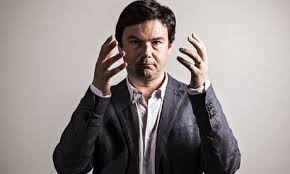 |
 |
Gets the capital (again) the debt? In his book Capital in the twenty-first century about the growing financial inequality, predicts the French economist Thomas Piketty that its consequences are disastrous, especially for poor countries. But in gloom expired does not. “My data is correct that inequality is no natural law of capitalism.”
INTERVIEW – and all of a sudden everybody talks about Thomas Piketty. Are substantial Capital in the Twenty-First Century was well before publication – the English translation appeared last month – showered with praise. Nobel Laureate Paul Krugman called it “perhaps the most important economic book of the Decade”, the Washington Post found it “an intellectual tour de force”, de Volkskrant describes it as “groundbreaking”, the Liberal, influential columnist Martin Wolf of the Financial Times is talking about a “extremely important book” and Branko Milanovic, former senior economist at the world bank, which recently voted it “a milestone in economic thought”. During the recent annual meeting of the International Monetary Fund said according to a report in the Dutch newspaper NRC Handelsblad “everyone in Washington” about that, until recently, virtually unknown French economist. Not long after is Capital the best selling book through Amazon.com.
At the very least, remarkable for a book that in 685 pages and 97 graphs a gloomy conclusion at first glance: inequality takes worldwide is exploding and will continue to do so as we do not intervene. The consequences can be disastrous.
In his dank little Office in a worn University building by the Ecole d’Economie de Paris responds Thomas Piketty (42) left on his success. “Oh well, it’s fun but also a hype. It takes time before you can say what the impact of a book is, and I’m wondering if all those people really have read my book. I have nothing geniaals figured out, I have done some crazy enough no one did before: large-scale data collection and over a long period to see how financial inequality develops. ” Piketty also hopes that his book will have an impact, because extreme inequality is very dangerous, he says. “I believe in books. Its political weapons. “
Piketty collected 15 years in 22 countries mountains dates on income and asset. Capital – the reference to Marx’s Das Kapital is clear – delivers more than enough ammunition for a discussion of the credit crunch since the subside in the focal point of the social attention State; even president Barack Obama spoke about “the defining issue of our time”.
For example: since 2009 – the low point of the credit crunch – went 95 percent of the income growth in the United States to the richest 1 percent. The last 30 years increased the share of the richest 10 percent of total u.s. prosperity property to 30 percent. The level of inequality in America is more or less equal to the level of early last century and larger than that of South Africa during apartheid. In the 1950s earned an American ceo about twenty times more than his average employee, now that more than two hundred times.
Anyone who believes that redistribute the fruits of their economy, Europeans got it wrong: the European inequality is almost the same size as on the eve of the first world war. Wealth inequality in the Netherlands is one of the largest in the world (see box opposite). Inequality is a global development; also in emerging countries like China, Brazil and India takes inequality hand over fist. Oxfam International calculated recently that the 85 richest millionaires possess more than the poorest 3.5 billion world citizens.
You mention inequality dangerous. Why?
“Extreme inequality undermines democracy. As a small group holds almost all economic resources, is no longer the principle ‘ all equal ‘. Everyone’s vote should count the same on paper, in practice, a small group of extremely rich in control. In addition, inequality a power source for populism, nationalism and racism because large groups feel left out and want to express their discontent. It is not by chance that on the eve of the first world war the European inequality was very large.
“In poor countries, there is an additional problem: economic inequality inhibits development. The wealthy elite in channelling large sums of money to Switzerland, Paris or London, while, for example, that should be used to finance education and infrastructure. This is an economic drama. Economic development requires strong institutions and mutual trust. Levying tax to finance is crucial for development, but if the elite here hardly contributes to a strong economy, undermines that building with strong institutions. The consequences of inequality in poor and emerging countries are much larger and more serious than in Europe or the United States.
If everyone has equal opportunities to become rich, there is no problem? The new super rich came mostly from the middle class, such as Bill Gates or the founders of WhatsApp.
“Let’s get those social mobility – anyone can be rich – especially. With inequality is nothing wrong, though with extreme inequality. The prosperity of the richest should be proportionate to the size of the economy. If three or four times their capacity growing faster than the economy, as the last few decades, something is wrong. Unbridled, extreme inequality is not only a moral, but also a practical problem: If you do nothing, has at some point, 1 percent of the population owned 99 percent of the economy. How to control such a country in a democratic manner? If the super-rich want to share with others the cake not middle-class, how can anyone still be rich? “
A Chinese who belong to the middle class is going through hard work, it will be little can care that there are also extremely rich in his country.
“I can well imagine. But at some point will also be Chinese, Brazilians and Indians against the problem of extreme inequality. They will have to answer the same question: what is in the long run the best way to distribute wealth? From my research it appears that prosperity does not automatically divides, you need policy. Now grow their economies still hard and takes for many people the prosperity – just as our economies after 1945 – but at some point they will flatten that growth and extreme inequality of us all. “
Many economists say that inequality is needed to accelerate growth. If you can be richer than others, you are going to work harder and grow the economy faster.
“If you look at the facts, you’ll see that Western economies at all grow faster when there is more inequality. In the decades after the second world war the American and European economies grew very strong while the inequality was much smaller than now. Currently our economies grow slowly while the inequality historically large. I would like to reverse the burden of proof: If you go for extreme inequality, evidence than that it makes sense. “
How is it that inequality increases?
Smiling, “that’s a simple question to which I needed for this book to answer … In short: rich get richer because their power is growing harder than the economy. The rate of return on capital – in the broadest sense, including real estate, stocks, et cetera – is over the years an average of five percent, while economic growth is substantially lower. “
Ongelijkheid in Europa en de Verenigde Staten
Het aandeel van het totale nationale vermogen van de rijkste 1 en 10 procent in de VS en Europa, 1810 – 2010
.Why was there right in the middle of the last century less inequality?
“This period, from roughly 1914 to 1945, is an exception to the historical development that pays more than a capital economy is growing. Here are several reasons for this. First, the economy grew strong because Europe and other parts of the world had to be rebuilt. Wages rose and the welfare State made its appearance. Second, many private wealth evaporates by hyperinflation and gnawed by the war. Thirdly, progressive inkomenstenbelastingen in Europe and America: who conducted much deserved, paid more taxes. The reconstruction had to be paid and communism contested, two expensive Affairs. In the 1970s changed this policy. A major reason is that economic growth flattened making the importance of capital rose. In addition to another political wind began fanning: the neo-liberalism of Thatcher and Reagan. Free-market capitalism, privatization and deregulation were the mantra. After the fall of the wall in 1989 won this politics to influence and hit international spread. Capital got more opportunities to grow. In the 1970s, was the private assets two or three times the size of the economy. Now that is five to six times as large. It took a couple of decades, but inequality is again on the level of early last century. “
That doesn’t sound encouraging.
“My data is correct that inequality is no natural law of capitalism! We have in the second half of the last century a golden age known with much growth and low inequality, not least thanks to political choices. If we do not want to have extreme inequality, out there not to be. I think that is a positive message. “
You advocates a global, progressive tax on power.
“Indeed. The current debate is mainly about exorbitant high earners, but we must not forget that it is a source of increased ability, extreme inequality is. I suggest to taxing net asset from 200 thousand euros with a half percent and increase this percentage as the ability increases. International cooperation is important because individuals and businesses can threaten with removals to countries with a favourable tax environment; by pulling together to prevent this. The proceeds should be spent on paying off our national debt. We must avoid no more interest charged to wealthy individuals who have lent money to the Treasury than we pay for instance to education, such as Great Britain in the nineteenth century. “
Beautiful, but politically unfeasible. In your book you describe your proposal as a ‘ useful utopia ‘.
“Right, but there is a continuum between what is possible and the best is. Countries can already take many measures – and that happens too. The Conservative Government in Spain has recently introduced a property tax. Italy has also taken steps in that direction. The German Bundesbank and the IMF have suggested with a property tax to repay the national debt. Certainly not leftist utopians, it seems to me. “
Portrait: Emmanuelle Marchadour
